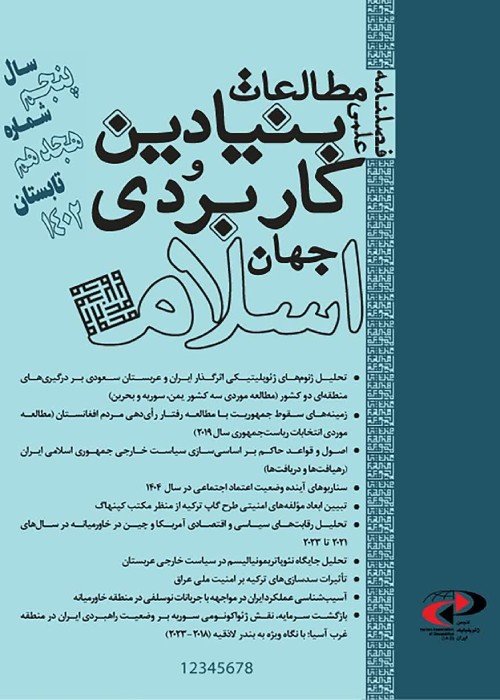A sociological reflection on the comparison of Lebanese and Iraqi political systems from the perspective of consensual democracy
Author(s):
Article Type:
Research/Original Article (دارای رتبه معتبر)
Abstract:
One of the best ways to achieve political stability in multicultural societies is by consensus democracy known as the "division of power." In this type of democracy, by using the four principles of the parliamentary coalition, autonomy, veto right, and proportional representation, it is tried to create political stability in the country and facilitate the circulation of elites in decision-making by sharing different strata and groups in power. Iraq and Lebanon are multicultural societies with ethnic, linguistic, religious, and cultural diversity. The Lebanese population consists of three major groups: Shiites, Sunnis, and Maronite Christians, and Iraq includes three major groups: Shiites, Sunnis, and Kurds. For more than half a century now, in Lebanon, and for nearly two decades, in Iraq, an agreed-upon consensus democracy has been implemented within the framework of their constitution. The mosaic texture of both and the creation of a relatively heterogeneous and heterogeneous society have led to the manifestation of political power based on this democracy and in the form of the pillars of the political system divided between them. Now, considering the shortcomings of the government process - nation-building and non-institutionalization of civil and participatory political culture and the lack or weakness of the party system and NGOs of the two countries, the question of the article focuses on the application of this democracy based on cultural-social diversity and compare their opportunities and challenges. In response, the hypothesis is formulated that consensus democracy is an option that is institutionally-politically capable of achieving relative security and stability by preparing the necessary platform for the participation of multiple ethnic, religious, and linguistic groups. The tribal context and the traditional sectarian tendencies of these countries and the continuation of social divisions are among the effective challenges in the fragility of this democracy. In this article, using both the institutional approach and the comparative method in examining the subject, this result was obtained.Given the multiculturalism of the two countries and the diversity of social divisions in them, consensus democracy is a good option for the political participation of various groups in the decisions of the two countries and has been able to focus on Parliament created relative but fragile stability. The traditional and tribal culture of the two countries, the problem of national identity, cultural barriers to civil society and non-governmental organizations, and the shortcomings of the nation-state-building process have made it difficult to realize the theme of this kind of democracy in practice.It is in the form of a modern dish but with traditional and undemocratic content. In other words, the shape and form of the political system derived from democracy are an agreement commensurate with the multiplicity and cultural diversity in these two countries. However, its content and theme are challenged and conflicted due to the low level of awareness and intellectual maturity of the society and the lack of political pluralism, and it does not have sufficient strength and consistency to create national security and social solidarity.And that is why both the smooth and peaceful transfer of power and the sustainable development and human security in these two countries face serious obstacles and problems, and from time to time we see violent behavior and turmoil or severe political crisis in which national sovereignty and endangers their independence and territorial integrity.The way out of this vulnerable and insecure situation is to train awareness and responsible citizens who have the ability to work together and work in groups and are tolerance and tolerant of opposing ideas, as well as political activism in a peaceful atmosphere away from monotony and self-centeredness. Clarification of economic and political relations, the institutionalization of governing norms and regulations, and the realization of civil institutions and non-governmental organizations are other requirements that can strengthen the foundations of consensus democracy in these countries by eliminating the roots of corruption and discrimination and facilitating citizens' political participation. Non-intervention of foreign powers is another important factor that can provide political independence and national sovereignty, the field of self-confidence of social forces and their interaction in these two countries, and their further role in the dynamics of political and social changes.
Keywords:
Language:
Persian
Published:
Journal of Fundamental and Applied Studies of the Islamic World, Volume:4 Issue: 11, 2022
Pages:
93 to 119
magiran.com/p2453140
دانلود و مطالعه متن این مقاله با یکی از روشهای زیر امکان پذیر است:
اشتراک شخصی
با عضویت و پرداخت آنلاین حق اشتراک یکساله به مبلغ 1,390,000ريال میتوانید 70 عنوان مطلب دانلود کنید!
اشتراک سازمانی
به کتابخانه دانشگاه یا محل کار خود پیشنهاد کنید تا اشتراک سازمانی این پایگاه را برای دسترسی نامحدود همه کاربران به متن مطالب تهیه نمایند!
توجه!
- حق عضویت دریافتی صرف حمایت از نشریات عضو و نگهداری، تکمیل و توسعه مگیران میشود.
- پرداخت حق اشتراک و دانلود مقالات اجازه بازنشر آن در سایر رسانههای چاپی و دیجیتال را به کاربر نمیدهد.
In order to view content subscription is required
Personal subscription
Subscribe magiran.com for 70 € euros via PayPal and download 70 articles during a year.
Organization subscription
Please contact us to subscribe your university or library for unlimited access!


